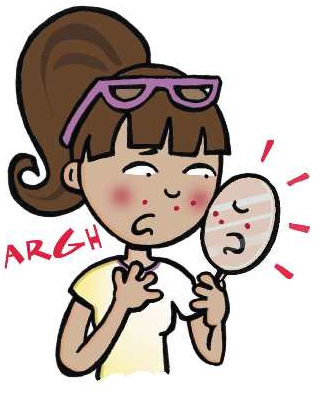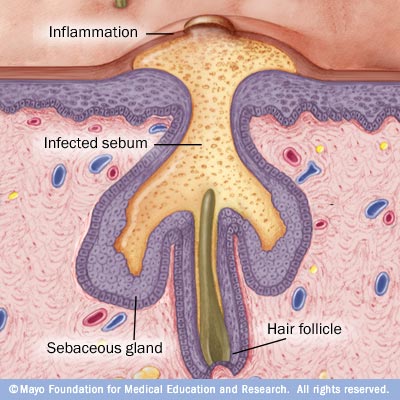What is Acne?
 How many times have you heard the question from people that suffer with acne, “What is Acne?” and “How do I get rid of it?” Crying out in sincere despair they want to know so they can live a “normal” life without fearing when the next flare up will come, “Will it be at the dance?”, “My date with Sally?”, “At graduation?” You really live with a foreboding anticipation of disaster. This is no joke either, studies do show that young people who have moderate to sever cases of acne will most likely suffer psychologically manifested in low self-esteem and even depression or suicidal tendencies.
How many times have you heard the question from people that suffer with acne, “What is Acne?” and “How do I get rid of it?” Crying out in sincere despair they want to know so they can live a “normal” life without fearing when the next flare up will come, “Will it be at the dance?”, “My date with Sally?”, “At graduation?” You really live with a foreboding anticipation of disaster. This is no joke either, studies do show that young people who have moderate to sever cases of acne will most likely suffer psychologically manifested in low self-esteem and even depression or suicidal tendencies.
So what is acne? Acne is really a general term that people use to define the red bumps and pimples that commonly occur with people that have more oily skin. This general term “acne” is used to describe many kinds of acne that may require different treatments from one another.
The different types of acne are:
- Acne vulgaris
- Acne conglobata
- Acne miliaris necrotica
- Tropical acne
- Infantile acne/Neonatal acne
- Excoriated acne
- Acne fulminans
- Drug-induced acne/Acne medicamentosa (Steroid acne)
- Halogen acne (Iododerma, Bromoderma, Chloracne)
- Oil acne
- Tar acne
- Acne cosmetica
- Occupational acne
- Acne aestivalis
- Acne keloidalis nuchae
- Acne mechanica
- Acne with facial edema
- Pomade acne
- Acne necrotica
- Blackhead
- Lupus miliaris disseminatus faciei
After looking over that list we see there are a number of reasons acne may plague our skin. It can be the result of medications that someone is taking.
The most common acne for young people is Acne Vulgaris, which is characterized by the red bumps and pimples that commonly occur on the forehead, face, neck, back, chest and shoulders and sometimes on the thighs.
So what is Acne? Many things but lets look at Acne Vulgaris, the most common type for young people and even adults into their 40’s and 50’s can experience “outbreaks” of acne.
Look at this picture…

The problem begins beneath the skin in the sebaceous glands. Acne typically develops as a hair follicle gets “plugged” by excess sebum, a naturally occurring oil and the addition of skin cells (keratin). This “plug” results in either a “blackhead” or a “whitehead” to form.
If in these favorable conditions, the naturally occurring bacteria, Propionibacterium acnes, can cause inflammation, which leads to the redness in the skin, scarring and hyperpigmentation of the skin.
Factors that can cause the conditions to be present that will increase the likeliness of acne are:
To conclude and answer the question, “What is Acne?”, the answer resounds back. The clogging of the pores, typically from the increase of sebum secretion from the increase in the hormone androgen. When you add the bacterium an inflammation can result.
Leave a Comment
You must be logged in to post a comment. Login.














Comments on What is Acne?
This is great information and so easy to understand. There are so many kinds of acne that it really surprised me.
I was lucky to find this http://www.revitalizebeautifulskin.com website.
Nice post! i like it, please bookmark this page in digg or mixx so that everyone could find it easily. 🙂 Thank you for sharing this info. You guys are doing a striking job
I’m glad that I’ve found your http://www.revitalizebeautifulskin.com web site.
Thanks for taking the time to discuss this, I feel strongly about information and love learning more on this. If possible, as you gain expertise, would you mind updating your blog with more information? It is extremely helpful for me.